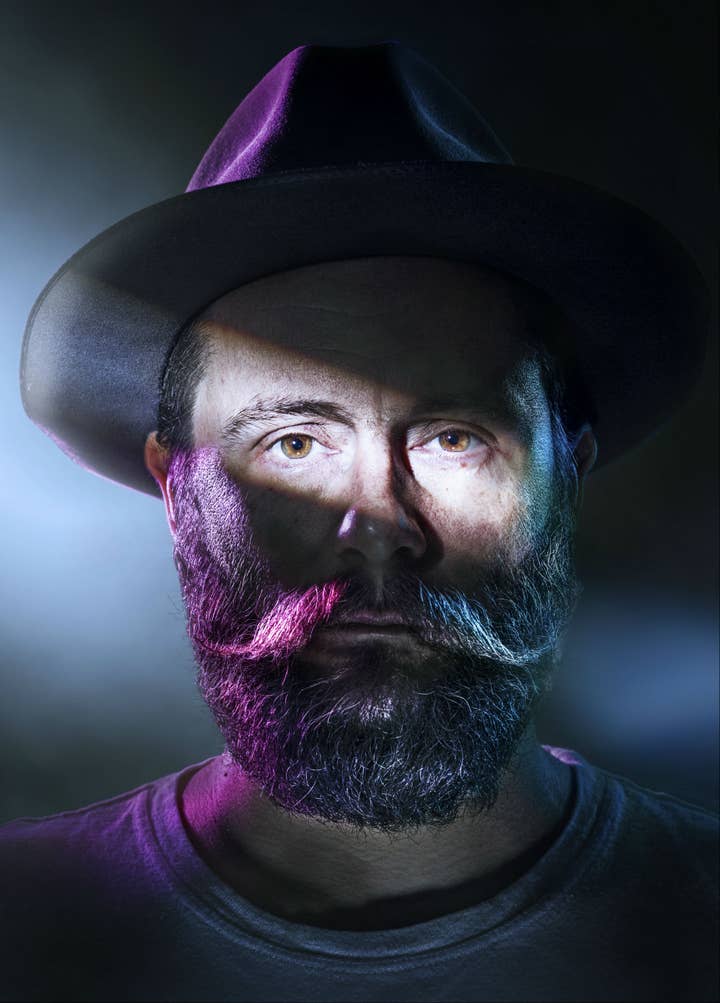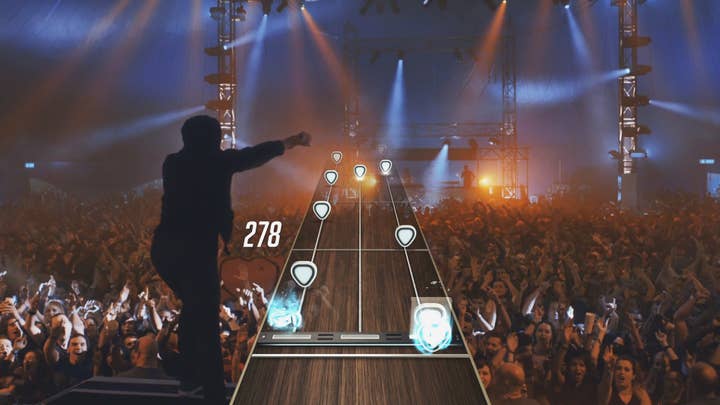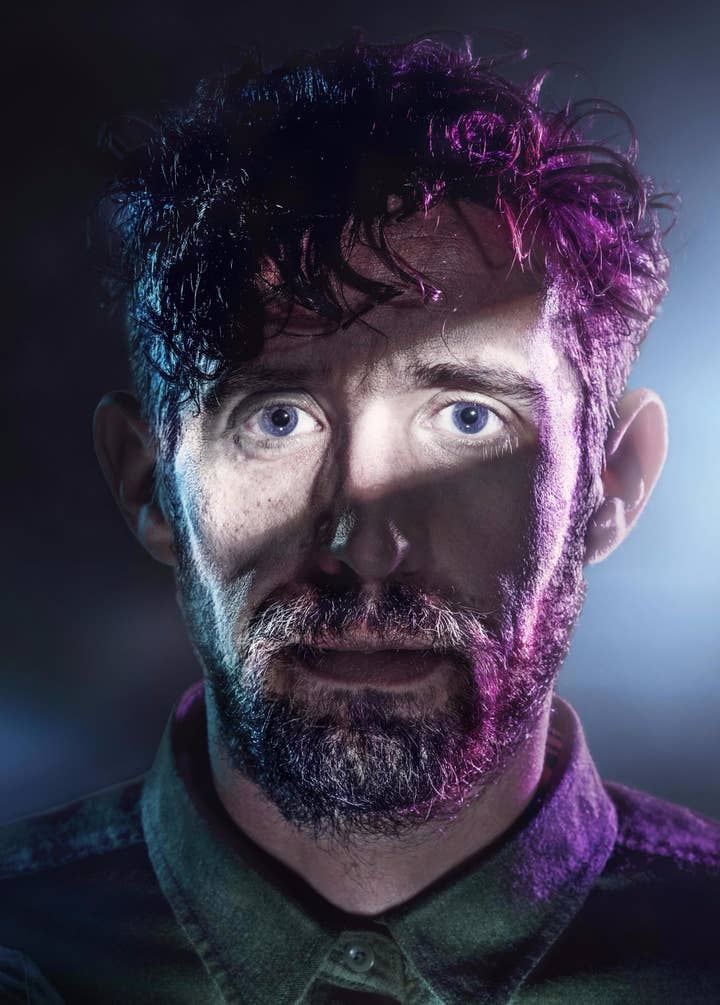Ex-FreeStyle founders: “The way games are made is broken”
Jamie Jackson and David Osbourn reveal their learnings from the Guitar Hero studio and new collaborative venture Slingshot Cartel
The long-awaited return of Guitar Hero in 2015 wasn't quite the series revival many had hoped for. Despite a warm reception from critics, its sales fell short of Activision's expectations. On April 1st 2016, the publisher took the decision to downsize its developer, FreeStyle Games, with around 50 staff laid off.
Also departing the studio last year were Jamie Jackson and David Osbourn, two of FreeStyle's six co-founders. The duo deem it unfair that hard-working developers so often suffer for commercial failures despite delivering as high a quality product as possible.
"In many ways, we feel the way games are made is broken," Jackson tells GamesIndustry.biz. "We put huge bets on making a game, and if that bet doesn't work out... well, we see it all the time: studios are being shut down, or resized. It seems to always be the developer that gets the sharp end of the stick. We were a bit fed up of how that worked."
Jackson, Osbourn and two of their colleagues, ex-FreeStylers Jonathan Napier and Gareth Morrison, decided to form a new studio - one heavily inspired by the development process of Guitar Hero Live. For the live-action videos that became a key-selling point for the 2015 title, with players performing to real crowds rather than computer-generated models, the FreeStyle team "essentially filmed two feature-length movies", according to Jackson. Learning how to make these videos, discovering more about compositing and the nature of film shoots meant he and his colleagues spent three-and-a-half years deeply embedded in a film-like industry - and that led to a revelation.

"Our industry is always being compared to the film industry," says Jackson. "The comparison is true, but it should have nothing to do with graphical fidelity, it's about the production - that's how we can learn a lot from the film industry.
"When we were making the Guitar Hero footage, we had hundreds and hundreds of people involved in that project, but only four or five were full-time. Everybody else were specialists brought in to do a specific job at the right time. Granted, you might pay a bit more money than you would if you were an employee, but if you only need them for two weeks then that's a lot more cost effective way of making something overall. We thought that was a good model and we felt it could apply to games.
"With most games we've worked on, the core creative vision that runs throughout is driven by a small, core group of people. You then bolt in art, code and design along the way. If you look at who takes part from start to finish, apart from your vision-holders, the only consistent thing was programmers. Everyone else dips in and out."
He offers artists as an example, suggesting they're only effective for around 60% of a given project. They need to have finished their work by that point so the project can go into QA and the build stage, with the art team 'pulled out' once they're done. It's the same, Jackson argues, for the design team.
"And that's no slight on artists, because I used to be one," he said.
"We feel the way games are made is broken. It seems to always be the developer that gets the sharp end of the stick. We were a bit fed up of how that worked"
Jamie Jackson, Slingshot Cartel
Obsourn adds: "The development cycle on Guitar Hero Live was a real eye-opener for us. It certainly made us reconsider how large games could be made differently. If you were to be more collaborative in your approach rather than monolithic, in terms of having a huge studio, that gives you access to experts at the right time.
"We're not here to knock anything that's been done before; this is about how can we improve and move forwards, how we can make games a little differently."
Jackson observes that at its peak, once you brought in extras for the videos, there were thousands of people working on Guitar Hero Live. When it came to the last month of the project, there were four people handling the edits. No one else was needed.
"We need to start adjusting the way we make games so we're not placing these huge bets and burdening development teams with that fear of what comes next," he says. "There must be a different way."
That different way is presented in the form of Slingshot Cartel, the duo's new studio. The name, we're told, stems from a variety of different sources. The developers remembered playing with slingshots as children, which could be made from anything and when combined with imagination could stand in for lots of different types of weaponry.
Cartel, meanwhile, was chosen partly because Jackson thought it a cool word to use and partly because of a definition the team stumbled up: a group of well-organised people that defines their own rules.
"Of course, it causes no end of problems getting a bank account," Jackson laughs.
Officially based in Leamington Spa, the four founders actually work remotely much of the time, using video conferencing to coordinate tasks and ideas. Obsourn describes it as "probably the most efficient we've worked in a very, very long time".
He continues: "This new journey is about collaborative development more than it is about the next massive studio, because that's not something you need to do in order to make great games in today's world.
"We're not here to try and build another 100 or 200-person studio. At the moment, we're here to make games with the rest of the development community, finding the right people to work with in the right place. Which is really exciting, because we've been in this industry for 20 years now, we've built up a good rolodex and we know who's really good and will pick up their phone. It's not necessarily something we could have done ten years ago."

Slingshot Cartel is already working with art firm Virtuos and another company in Leamington Spa that's helping with character models. So far, so good.
But by aping the Hollywood model of bringing in specialists as and when needed, does the new studio not run the risk of facing another problem from the movie world, one that delays projects by months or even years: scheduling conflicts?
"That's a risk, to some extent," Jackson admits. "But if you can't get one art department, you can get another. When it comes to art, for example, there have been art outsource teams for such a long time now that there's a good range of choice. While I'm not going to say we're definitely not going to hit an issue where we suddenly might not be able to use them, the great thing is because we're all working within similar engines and tools, we can work with someone else if need be.
"By starting small, it gives you more breathing time to figure out the game before the clock starts ticking on a very large development budget that is disappearing through your hands"
David Osbourn, Slingshot Cartel
"And there are more and more of these different outsourcers coming about. Audio, for example. A lot of great game audio is not in-house. Even us - you'd be surprised we only had about five people working in the Guitar Hero audio department, which you'd think isn't enough for a music game, but to be frank they only kicked in at the end of the project when it was needed. It's all about that cost again. We probably paid for someone for half a year where they weren't actually committed to the project. That's no slight on them. That's just the way the project worked."
Osbourn adds that, while conflicts might occur, the collaborative model and their newfound independence gives them more freedom to set their own schedules.
"What we've often found in the past is there's real pressure to get a game started, a financial pressure - particularly when you're working with a large group of people that need to be doing something," he explains. "By starting small, it gives you more breathing time to figure out the game, figure out the look and feel, what you want to do with it, and how you're going to do it before the clock starts ticking on a very large development budget that is disappearing through your hands. There are definitely logistical headaches you can get with this approach but the upsides you get at the beginning of the project make up for that."
The duo also points out that what they're doing isn't entirely unheard of in the realm of video games. The rise of one-man indies means plenty of hit games have been made by multiple teams or specialists collaborating on a single project - just on a different scale to what Slingshot Cartel has planned.
The new model will also enable Jackson, Osbourn and their team to work on multiple projects at once. Osbourn notes that this is something they are already proficient in thanks to their time at an Activision-owned studio: while FreeStyle was best known for its music games, it often contributed to the publisher's other properties, including Skylanders and Call of Duty.

"We want to be able to work on multiple projects," Jackson stresses. "That's another thing about this industry - we tend to start on one project and that's the only thing we do for a long, long time. That can really sap your creativity. You can hit writer's block really quickly if you only do one thing."
Slingshot Cartel will reveal its first project in just a few weeks at GDC 2017. While they were unable to offer much in the way of concrete details, Jackson claimed it ties in particularly well with his interests, identifying himself as a "huge science-fiction nerd who loves robots and ninjas, plays Warhammer 40K and even paints the models". The game will be an eSports title, is "set in a future world" and sounds far more substantial than another Guitar Hero.
"We've built a great lore," Jackson teases. "Our inner nerd has been released.
"And once we get through GDC, which is very much more of a tech reveal, we don't have a deadline to release this. We know when we want to, and we'll talk about that later, but we can actually throttle that right back, crawl back under our design rock and just polish our design without having this huge pressure that we have to release the game by a certain date for the sake of the shareholders or someone else."
"We are very proud of everything we did at FreeStyle, but we have no intention of making a music game any time soon"
Jamie Jackson, Slingshot Cartel
The idea of the people behind DJ Hero and Guitar Hero Live working on a hefty sci-fi romp might surprise those who follow their work, but Jackson insists the whole point of forming Slingshot Cartel is to branch off into new directions.
"We are very proud of everything we did at FreeStyle, but we have no intention of making a music game any time soon," he says. "We made them for such a long time, I think we made very good ones, and the quality bar we set ourselves was very high - it still is now - but this is about a different journey."
Herein lies perhaps the greatest challenge the new team faces: breaking past their reputation. Scores of seasoned developers have left their studios and attempted something new only to find themselves - sometimes out of genuine passion - creating much the same games as they have for years. Managing people's expectations when exploring a different genre can be much more difficult.
"Obviously you get known for what you're good at, and once you're in the cycle of making certain games, you obviously become a bit of an expert at it," says Osbourn. "It becomes easier, I guess, to work within that field and come up with new things for it. So it is difficult to break out.
"It is definitely hard to lose that music game tag, but at the end of the day if you can make a game, if you understand games, you can definitely apply those skills to different genres. Personally, I think it's a refreshing thing if teams show they can do that.
"From a creative point of view, it's a good idea to flip into a different mode where it's not comfortable, you're not relying on previous ideas. It forces you to exercise your brain and your creativity."
Jackson adds: "Yes, we ended up making music games, but I still don't really know how that happened. When me and Dave started, we were making Colin McRae Rally, driving games and then we somehow ended up being the music game guys. I'm really proud of everything we've done, immensely proud, but I'm getting a bit older now and I want to work on games that I really want to make.
"I hate that we get labelled. It really irritates me. We make games, that's what we do. When we made our music games, we didn't go home and play music games. I went home and played The Division, Destiny or I dig out personal favourites like Tenchu: Stealth Assassin. I think it's really fucking irritating, and I'm sure it will be hard, but it's not hard on us. I think it's hard on other people accepting that we'll do something different.
"From our point of view, we're going to make a really cool game. It comes down to how the press and how the players receive us. The proof's in the pudding. Can we do it? I absolutely believe we will. If we launch this game and it doesn't work out, will we go back and do a music game? Probably not. We'll just keep going with something different.
